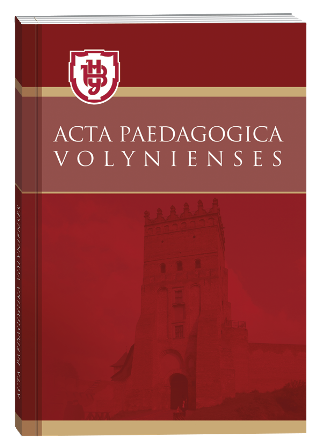DIDACTIC FEATURES OF APPLICATION OF TUTORIAL TECHNOLOGY IN THE MODERN MILITARY EDUCATIONAL SYSTEM OF UKRAINE
DOI:
https://doi.org/10.32782/apv/2021.6.27Keywords:
«future border officers»; «professional training»; «tutoring technology»; «innovation»; «personality»; «tutor support».Abstract
The article is devoted to the problem of introduction of tutoring technology in the educational process of the National Academy of the State Border Guard Service of Ukraine. The purpose of the article was to summarize the analysis of the experience of introducing tutoring technology in the training of future professionals. The author proved the relevance of the problem proposed in the article: the content of professional training of future officers of the State Border Guard Service of Ukraine should use the best practices of training a specialist in the security and defence sector. Among the areas of ensuring a high level of professional training of future border guards is the use of educational innovations. in particular, democratic orientation. In accordance with the proposed problem, a careful analysis of the scientific pedagogical literature. The author presented the definition of tutoring technology as a form of humanistic education. The content of the activity of teachers-tutors in the Academy of Border Guard Service as a certain specialization of professional pedagogical activity of a scientific and pedagogical worker, which arose and implements its functions in the new organizational conditions of the educational process, is specified. A set of methods inherent in tutoring technology (verbal and nonverbal (practical, visual); inductive (from partial to generalized) and deductive (from general to partial); problem-searching) is analysed. The specific features of the implementation of tutoring technology in the Academy of Border Guard Service are determined. The levels of tutoring in the Academy of Border Guard Service are presented (first-level tutors act as mediators, consultants, assistants; second-level tutors act as experts, analysts, researchers and advisors; third-level tutors act as top managers who competently shape educational policy. further research.
References
Альохін М.М. Тьюторський супровід соціального розвитку учнів початкової ланки приватної школи як інноваційна соціально-педагогічна технологія. Науковий вісник Південноукраїнського національного педагогічного університету імені К. Д. Ушинського. Одеса : ПНПУ ім. К.Д. Ушинського, 2020. № 2(131). С. 87–94.
Бойко А.М. Тьютор – якісно вища педагогічна позиція і новий простір духовно-моральної взаємодії. Педагогічні науки. Полтава, 2011. С. 4–10.
Настенко Л. Тьюторство як прогресивна технологія індивідуалізації освіти у вищій школі. Гуманітарна освіта в технічних вищих навчальних закладах. Київ, 2010. С. 259–269.
Осадча К.П. Теоретико-методологічні засади професійної підготовки майбутніх учителів до тьюторської діяльності : автореф. дис. ... докт. пед. наук : 13.00.04. Запоріжжя, 2020. 43 с.
Слінько Л.А. Тьюторство як технологія супроводу молодих спеціалістів. Інформаційно-методичний посібник управління освіти. 2018. Вип. 11 (87). С. 37–38.
Сучана А.К. Формування ціннісно-смислової готовності до тьюторської діяльності у магістрів гуманітарних спеціальностей : дис. ... канд. пед. наук : 13.00.04. Кіровоград, 2016. 266 с.
Тьюторська діяльність / упорядник С. Вєтров. Інформаційний збірник для директора школи та завідувача дитячого садка. 2017. № 23–24. С. 21–69.
Швець Т. Тьюторські компетенції, або Чому не кожний вчитель може стати тьютором. URL: https://osvitanova.com.ua/posts/1404-tiutorski-kompetentsii-abo-chomu-ne-kozhnyi-vchytel-mozhe-staty-tiutorom (дата звернення: 07.09.2021).
Торічний О. В. Теорія і практика формування військово-спеціальної компетентності майбутніх офіцерів- прикордонників у процесі навчання. Хмельницький: Вид-во Національної академії ДПСУ, 2012. 535 с.
Ягупов В.В., Свистун В.І. Компетентнісний підхід до підготовки фахівців у системі вищої освіти / Наукові записки. Педагогічні, психологічні науки та соціальна робота. 2007. Том 71. С. 3–8.







